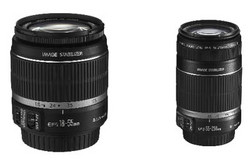Canon EF-S 18-55mm and 55-250mm
 Press Release:
Press Release: 
With equivalent focal lengths of 29-88mm and 88-400mm respectively, the lenses are the first in the EF-S series to incorporate a 4-stop Image Stabilizer, dramatically extending low-light performance. Both lenses incorporate specialist optics to achieve exceptional image clarity - the EF-S 18-55mm f/3.5-5.6 IS employing an aspherical lens element with the EF-S 55-250mm f/4-5.6 IS benefiting from an Ultra-Low Dispersion (UD) lens element.
The lenses are built to fit exclusively on those EOS cameras with an EF–S lens mount – including the new EOS 40D, EOS 30D, EOS 400D and earlier models.
EF-S 18-55mm f/3.5-5.6 IS
The EF-S 18-55mm f/3.5-5.6 IS is a lightweight general-purpose zoom lens that is ideal for handheld photography in a wide range of lighting conditions. Offering high optical quality, the lens has an 11 element, 9 group construction, including one aspherical element for crisp corner-to-corner detail. The lens maintains a closest focusing distance of just 25cm throughout the zoom range, giving photographs the flexibility to frame up close when needed.
EF-S 55-250mm f/4-5.6 IS
Compact and lightweight, the EF-S 55-250mm f/4-5.6 IS offers the longest zoom range in the EF-S series to date. The 88-400mm equivalent focal length opens up new framing possibilities for owners of EF-S mount cameras shooting wildlife, sports and travel photography. Optical quality is assured through a UD element, which minimises chromatic aberrations that could otherwise cause reduced contrast and colour fringing.
4-stop Image Stabilizer
Canon’s latest optical Image Stabilizer (IS) technology provides up to 4-stop compensation for image blur caused by camera shake and slow shutter speeds. Photographers normally shooting handheld at 1/250 sec can switch on IS to obtain a similarly steady and blur-free result with a shutter speed of just 1/15 second. The inclusion of automatic panning detection makes it easier for photographers to track wildlife and other moving subjects. To ensure consistently accurate results at all zoom positions, the IS system within each lens has been optimised for that lens’ specific focal length range. Since the IS system is based within the lens, the results are visible through the viewfinder when framing the image.
Appealing background blur
Both lenses also incorporate a circular aperture. This helps create an even background blur when depth of field is minimised, giving photographers more creative options for portraiture and similar types of photography.
Super Spectra coatings
Both models employ Canon’s patented Super Spectra coatings to suppress flare and ghosting – more prone to occur with digital cameras due to reflection off the image sensor. By increasing light absorption, coatings reduce reflections off lens element surfaces to deliver crisp, undistorted images with natural colour balance.
E-TTL II flash integration
The lenses transmit distance information to the E-TTL II flash system of all current model digital EOS cameras, improving flash exposure metering when used in conjunction with Canon’s range of EX Speedlite flash units.
In keeping with Canon’s Kyosei philosophy of living in harmony with the environment, the lens features only lead-free glass.
Add your message
Please login here or if you've not registered, you can register here. Registering is safe, quick and free.
photodo Stats
428 MTF tests
74 in-depth photodo reviews
100+ users join each day
Help the lens community by reviewing or rating a lens today via our lens search
Latest Lens Reviews
- Chinon 28mm f/2.8 Vintage Lens Review
- Canon EF 70-200mm f/4L IS II USM Lens Review
- Samyang AF 85mm f/1.4 EF Review
- Sigma 70mm f/2.8 DG Macro Art Review
- Samyang AF 24mm f/2.8 FE Review
- Meike 50mm f/1.7 Review
- Tamron 70-210mm f/4 Di VC USD Review
- Lensbaby Burnside 35mm f/2.8 Review
- Asahi Super Takumar 50mm f/1.4 Review
- Asahi Super-Multi-Coated Takumar 135mm f/3.5 Review
